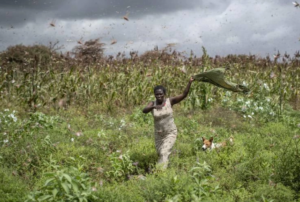Smart Harvest
By James Wanzala | 1 year ago
As the swarm of locusts sweep through farms fast and furious, State actors and stakeholders in the crop industry are debating on whether chemical spraying is the best solution.
Non Governmental Organisations (NGOs) have been calling on the government to ban use of chemicals in spraying the invasive locusts saying they are not safe for humans and the environment and have been banned in Europe because of their link to cancer.
Already, a petition has been forwarded to Parliament seeking a ban on 262 pesticides used in the country over claims that some cause cancer and infertility.
The Ministry of Agriculture and the United Nations Food and Agriculture Organisation have been fighting the locusts with pesticides such as Fenitrothion, which has been listed in the petition among the deadly one banned in Europe.
Agrochemicals Association of Kenya (AAK) and Fresh Produce Consortium of Kenya (FPCK), speaking at a press conference last week in Nairobi said the chemicals being used on Kenyan farms are safe.
Environmentally friendly
aak-GROWchief executive officer Erick Kimunguyi said Kenya has one of the best legislation covering regulation of pesticides which falls under the Pest Control Products Act and which is applied by the Pest Control Products Board (PCPB).
“The PCPB has excellent scientists and legislation and regulatory structure we have only allows approved pesticides for use in Kenya. The chemicals have been subjected to the most thorough international testing standards applied in the US and Australia. We cannot allow into the market pesticides that are deemed or classed as a risk to human health and the environment,” said Kimunguyi.
He pointed out that chemicals such as Fenitrothion, is not among the 262 that petitioner want banned in Kenya.
Fenitrothion is a phosphorothioate (organophosphate) insecticide it is inexpensive and widely used worldwide. FPCK chief executive Okisegere Ojepat said a move by Parliament to ban 262 pesticides approved for use in Kenya would slash the country’s maize production by 70 per cent, create a ballooning locust problem and lead to collapse of the agriculture sector. But there is a group also pushing for more natural ways to curb the locust menace as opposed to chemical use.
In a two-page letter, the National Climate Change Secretariat, the Council of Governors and the East Africa Climate Change Network (EACCNET) have suggested more environmentally friendly methods to fight the locusts.
“The chemicals used will create a more fatal environmental problem when the chemical is blown off towards humans and animals,” said Patrick Kamotho, executive director of EACCNET.
Practical solutions
A more practical solution he said, is generating powerful decibel, anything that generates sound decibel above 130Db, jet fighters, fireworks and grenades which will ensure the locusts instantly perish.
“The decibel will shock them to death just like it’s done in wheat farming during invasion by birds which are scared off using a powerful blast,” said Kamotho.
He went on: “Another solution is mobile cordon mesh fence, where old and fragile grasshoppers will be trapped and harvested.”
Last year August, agricultural groups including Route to Food Initiative, Biodiversity and Biosafety Association of Kenya, Kenya Organic Agriculture Network and Resources Oriented Development Initiatives, condemned the use of chemicals on farms.
They cited rising cases of cancer and called for a ban on pesticides for public safety. They pushed for immediate withdrawal of dozens of imported pesticides that contain active ingredients like permethrin, carbendazim and acephate, which are said to be toxic to human health.
According to the lobbysts, at least 32 per cent of pesticide active ingredients sold in Kenya, have been withdrawn from the European market, due to their negative impact on human and environmental health.
As the debate continues, meanwhile, the desert locusts have spread to eight counties including Mandera, Wajir, Marsabit, Isiolo, Garissa, Meru, Laikipia, Turkana and Baringo.


